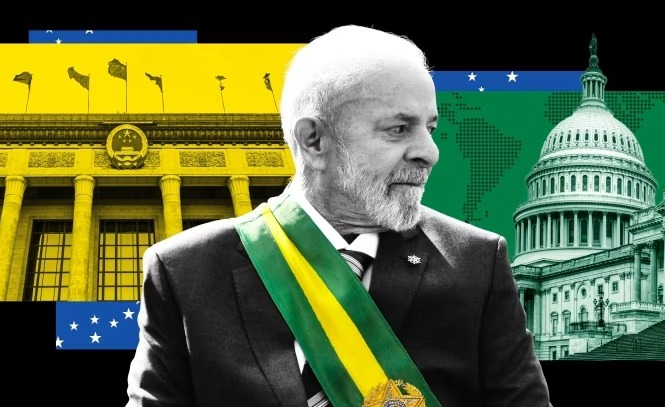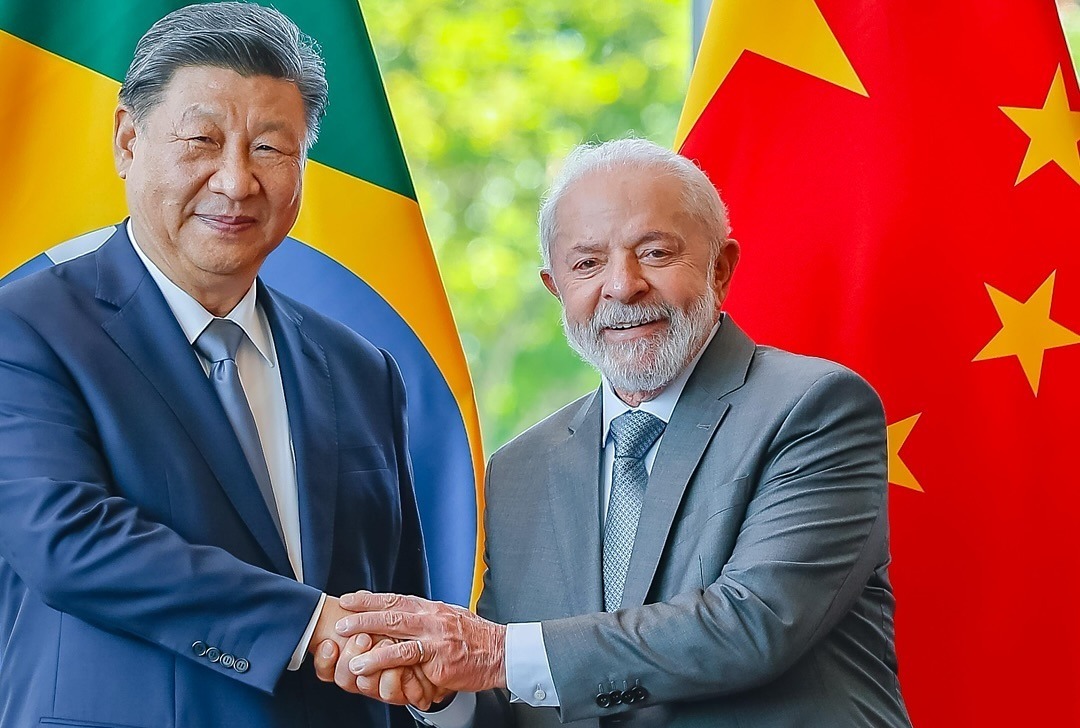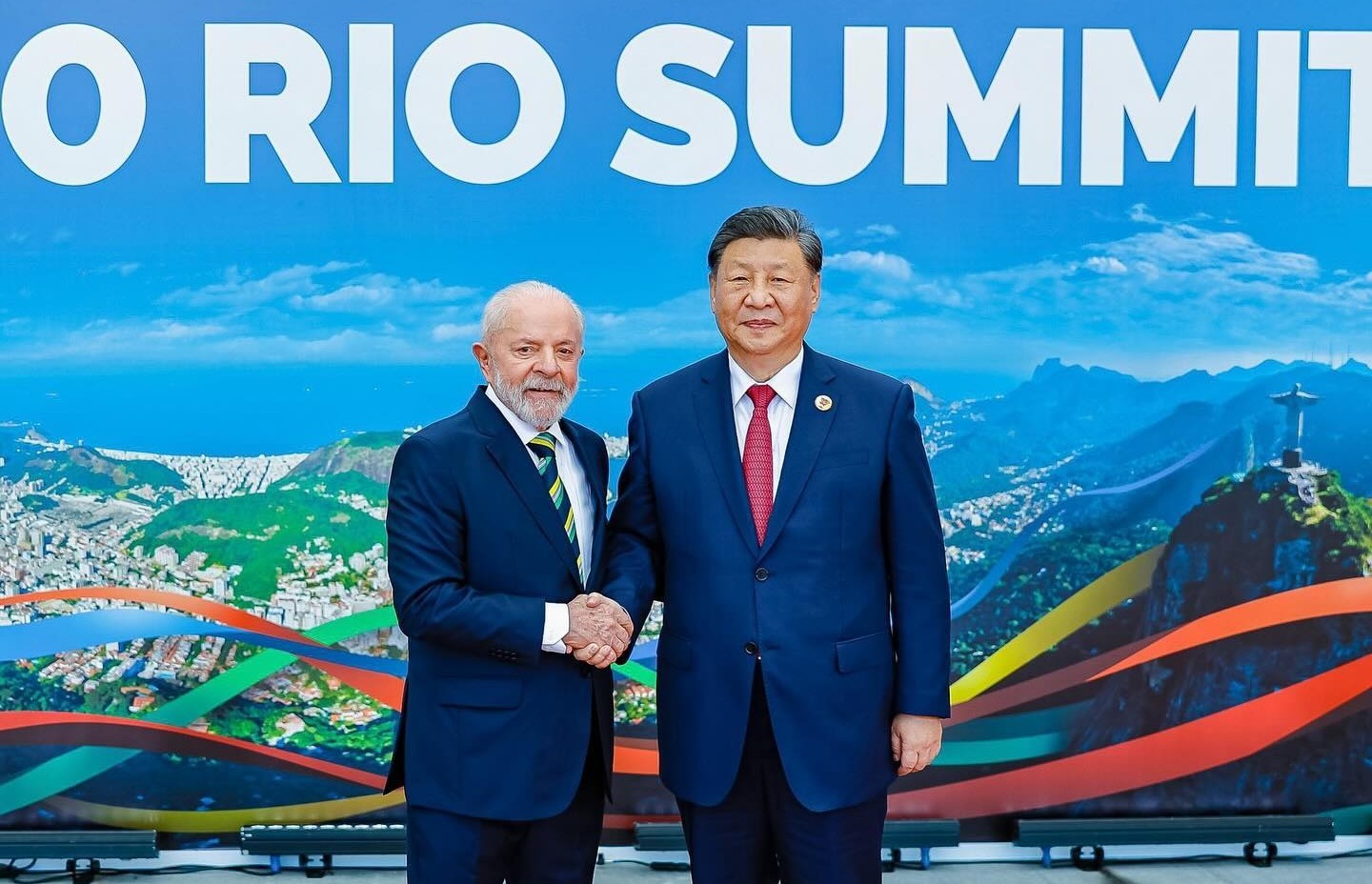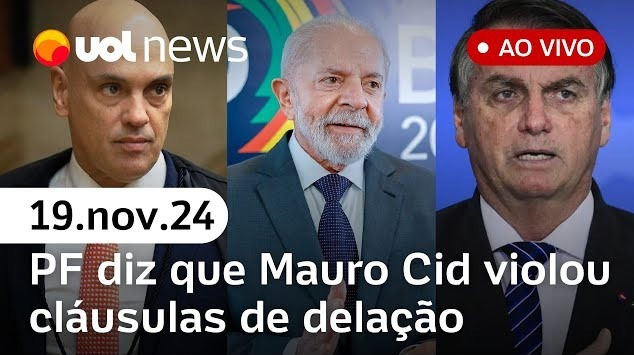President Lula has sought to maintain ties with the US, China and Russia. But even before the re-election of Donald Trump, that diplomatic space was shrinking
Michael Stott in London, Michael Pooler in Brasília and Bryan Harris in São Paulo
"Brazil is back," vowed president-elect Luiz Inácio Lula da Silva to cheering crowds at the COP27 climate summit in Egypt two years ago. Having defeated his hard-right rival, Jair Bolsonaro, and won back power after more than a decade out of office, Lula wanted to flag not only his own comeback but his desire to return the South American giant to the global stage.
During Lula's first two terms, and before corruption scandals tarnished his reputation, the former metal worker had been feted as an international star. At one of the first meetings in 2009 of the G20, a body that gave Brazil a rare seat at the top table, then US president Barack Obama dubbed him "the most popular politician on Earth". That same year, Brazil also co-founded the Brics bloc of developing nations.
Now Brazil - and Lula - are back in the spotlight. On Monday, the president will host the G20 leaders in Rio de Janeiro, one in a series of high-profile international summits to come. Some time next year, Brazil will welcome the newly expanded Brics group of emerging countries, and in November 2025 will also host the annual UN climate conference in the Amazon port of Belém.
Lula's return to centre stage says much about the shifting geopolitics of the era, as growing competition for influence between the US and China gradually overshadows a system of international institutions once dominated by Washington.
The new environment has opened up space for a group of middle-ranking powers, many of them not formally aligned - among them Brazil, Turkey, Indonesia and the Gulf states, as well as India, a potential future superpower. Many of these governments are trying to expand their international influence in part by playing off the US, China and in some cases Russia.
But Brazil's efforts to take advantage of the changing geopolitical landscape are also facing challenges. Lula's attempt to act as a regional power and mediate the political crisis in Venezuela has floundered. Brazil, which prides itself on its own transition from dictatorship to democracy, has been uncomfortable at Russia and China's efforts to make the Brics group more openly anti-western. And the election of Donald Trump in the US is likely to complicate Lula's plan to showcase its climate diplomacy.
The country, say analysts, now finds itself having to navigate a much more complicated international scenario, in which its traditional neutrality may come under pressure from all sides. "Brazil is hedging. It's on the fence," says Oliver Stuenkel, a foreign policy expert at Brazil's Getulio Vargas Foundation, of its approach to China and the US.
"Brazil is seeking to implement now this strategy of multi-alignment in a very uncertain global environment," he adds. "Its major source of power, the capacity to navigate multilateral fora . . . is under so much strain now that this strategy of multi-alignment will become more challenging and maybe more costly."
At the beginning of his third term, Lula was facing an uphill struggle. Bolsonaro had allowed Amazon deforestation to soar, mocked coronavirus as a "little flu" and shunned the international community. Meanwhile, Ernesto Araújo, his predecessor's first foreign minister, described climate change as a plot by "cultural Marxists" to weaken the west by helping China.
Upon taking power, Lula defined Brazil's diplomatic aims afresh - seeking leadership in global climate diplomacy, reinvigorating his life-long battle against hunger and poverty, and pursuing an end to wars through a posture of engaged non-alignment that attempts to foster co-operation without taking sides.

In a whirlwind of diplomacy since his inauguration in January 2023, Lula has mended relations with US President Joe Biden, the EU, Africa and China - all estranged under Bolsonaro - as well as maintaining ties with Russia and India.
"It's a foreign policy that looks for independence through balance in the world and multipolarity," says Celso Amorim, a foreign minister in Lula's previous terms and now his top adviser on international affairs. "We don't want the world dominated either by one country or by one ideology, or much less by one person."
Brazil's well-resourced and professional diplomatic service gives it particular clout, along with its long record of international engagement - it was a founder member of the League of Nations in 1919 and held the inaugural UN climate summit in Rio de Janeiro in 1992.
However, the country's posture has at times caused disquiet in Washington and Brussels. Lula's desire to play peacemaker in the Ukraine war irked backers of Kyiv, who accused him of favouring Russia, particularly when he welcomed Putin's foreign minister, Sergei Lavrov, to Brasília in April 2023.
Even before his election, the president upset European and American allies of Ukraine by suggesting Kyiv was jointly to blame with Moscow for the conflict. After Lula suggested last year that Washington was prolonging the war by supplying arms to Ukraine, a US National Security Council spokesman accused Brasília of "parroting Russian and Chinese propaganda".
Brazilian diplomats insist that Brazil voted to condemn Russia's invasion of Ukraine at the UN (India and South Africa abstained), and allies of Lula reject the accusation of one-sidedness. "I'm not justifying what Russia did, I'm critical," says Amorim. "President Lula was critical . .. but to think that you can destroy Russia . . . [is] a dangerous illusion."
Not everyone buys that argument. Some point to Brazil's strong economic links to Russia as evidence that Brasília is not neutral. Moscow is the biggest supplier of fertiliser to Brazil's huge agricultural sector, and Brazil has been an eager buyer of cheap Russian diesel, as the west boycotts Moscow's fuels.
Although it may be unpopular in much of the west, Lula's position on Ukraine is widely shared across the developing world. Nations such as India, China, Mexico and South Africa concur with his view that the US and Europe should be pursuing a diplomatic solution to the conflict, instead of sending ever more powerful weapons to Ukraine and imposing draconian economic sanctions on Moscow.
"On Ukraine, on other policy issues, whether it's Middle East, whether it's dealing with China, Lula has steered Brazil towards largely the same non-aligned policies being pursued by others of the emerging powers in the G20," says Michael McKinley, a former top state department official and US ambassador to Brazil.
All these nations are "working a challenging landscape, [trying] to keep channels open and at the same time pursue their own national interests," he adds.
In the same vein, Lula's comparison of Israel's military action in Gaza to the Holocaust may have underlined differences with Washington and led the Israeli government to declare him persona non grata. But it is much more in tune with the positions of fellow developing G20 nations such as India, Turkey, Saudi Arabia and South Africa, which has lodged an allegation of genocide against Israel at the UN's top court.
South Africa's ambassador in Brazil praises Lula's foreign policy platform. "From the point of view of South Africa, it's positive. And for the sake of the [global] south, we should support it," says Vusumuzi Wellington. "Brazil had disappeared from the global stage. [Now its] standing has improved."
At home, however, Lula's positions have drawn fire from conservative critics who accuse him of losing credibility with Brazil's traditional partners. "This administration's position towards conflicts in Ukraine and the Middle East has distanced Brazil from the west," says Marcos Troyjo, a former diplomat nominated by Bolsonaro to head the Brics bank, which he led from 2020 to 2023.

He argues that the Lula government had abandoned core values and damaged Brazil's interests "in a rather naive embrace of global south rhetoric". "The consequence is Brazil ends up punching below its potential weight," he adds.
Others warn against the dangers of excessive ambition. "Brazil is an average regional power," says Rubens Barbosa, president of the Institute of International Relations and Foreign Trade and former Brazilian ambassador to Washington. "We don't have the surplus power to influence major issues of war and peace in the world."
Amorim, Lula's adviser, counters that "part of our work is precisely to work against this polarisation, which is bad for the world. It's bad for China, but it's also bad for the United States".
Among western diplomats there is nonetheless anxiety over the direction Brazil may take. Brasília's proximity to Beijing, by far its largest trading partner, is a particular source of concern.
"Where is Brazil heading? Is it equidistant, or does it turn to the east?" asks a senior European official. "Our interest is in making democratic partners like Brazil stronger."
Yet Brussels has so far failed to secure ratification of a landmark trade deal between the EU and the Mercosur bloc of South American nations which has been pushed by Brasília, a treaty that might serve to lessen Brazil's dependence on China.
During his first stint as president, from 2003 to 2011, Lula deployed the pragmatism honed as a trade union negotiator to build bridges between the developed and developing worlds. He cultivated good working relationships across the political spectrum, from US President George W Bush to the late Venezuelan revolutionary socialist leader Hugo Chávez.
In a world facing multiple wars and a climate crisis, such skills are, if anything, even more in demand. "Tangible results include Brazil's reintegration into international forums, especially on the climate agenda," says Fernanda Magnotta, a professor of international relations at the Armando Alvares Penteado Foundation in São Paulo.

She cites the country's selection to host the COP30 summit in Belém and the restoration of the Amazon Fund, which is managed by the state development bank BNDES and finances conservation projects with foreign contributions but was frozen under Bolsonaro.
Along with India, Brazil has also walked a careful path within the Brics grouping, trying to ensure that it does not turn into an explicitly anti-western bloc. Brasília went along reluctantly with Brics' expansion last year to include Egypt, Ethiopia, Iran and the UAE - a key Chinese goal - but has so far not joined 22 other Latin American and Caribbean nations in signing up for China's flagship international infrastructure programme, the Belt and Road Initiative.
For Brazil, says Stuenkel, "Brics is important to show Washington that we have got alternatives. [Not joining Belt and Road] is important to show China that it is a key partner, but we are not desperate for their investment."
Lula has also encountered considerable diplomatic challenges on his own doorstep. The "pink tide" of mainly leftwing Latin American governments in which he swam in his first two terms has been replaced by a more antagonistic regional landscape. Conservative governments in neighbouring Argentina and Paraguay, plus Ecuador and El Salvador, have clashed with the leftwing presidents of Chile, Colombia and Mexico. Few are keen to defer to Lula, the veteran standard-bearer of the Latin American left.
Lula has also struggled to revive Unasur, the South American inter-governmental organisation of his earlier presidencies, and his efforts to resolve neighbouring Venezuela's long-running political crisis have so far led nowhere. Relations with President Nicolás Maduro have been strained by the latter's insistence that he won an election in July, following an official result that most independent observers believe was grossly fraudulent.
After Brazilian requests to produce evidence of his victory produced months of stonewalling by Maduro, Lula has refused to recognise the election result. Given the long-standing political ties between Lula's Workers Party (PT) and Maduro's revolutionary socialist movement PSUV, this was an outcome few had expected.
Speaking at a congressional hearing, Amorim said there had been a "breach of trust" in Venezuela, prompting Caracas to accuse him of being a "messenger of North American imperialism". After Brazil blocked Venezuela's efforts to join the Brics, Caracas recalled its ambassador from Brazil and complained of "immoral aggression".
Gunther Rudzit, assistant professor of international affairs at ESPM, believes Lula's struggles for regional integration represent a foreign policy defeat. "If we can't solve regional problems, trying to lead the global south is simply impossible," he says.
But others, such as McKinley, are more sanguine. "I think Brazil has responded to a changed global environment," he says. "Seeing where Brazil fits in, where Brazil can influence and where Brazil perhaps needs to stand back somewhat."
There is broad agreement that the issue of climate change is where Brazil has the most potential - and moral authority - to exert diplomatic leadership. Deforestation of the Amazon has fallen sharply under Lula, and the nation already generates most of its electricity from renewable sources and is a leader in biofuels.
Some green campaigners complain of hypocrisy, given that Lula is in favour of expanding Brazil's oil production. But Brasília's argument that revenues from hydrocarbons can help fund the green transition and social programmes resonates in other developing countries that are rich in fossil fuels.
In Rio next week, Brazil is set to formally launch an international alliance against hunger, a theme dear to Lula given his childhood experience of poverty. Another key proposal of his G20 presidency is a global tax on the super-rich. Although the US has poured cold water on the idea, Brazil believes its time will come.
"It's like planting seeds," says one Lula adviser. "Think of the global south idea. It took a long time, but now it is blossoming."

However, what should be Lula's moment to shine now risks being overshadowed by the election of Trump as US president. The Republican's scepticism about global warming and disdain for multilateralism threaten some of Brazil's key foreign policy goals, according to analysts.
Thomas Traumann, a political consultant and former Brazilian communications minister, says Lula had "planned to be centre of the show", but the political upheaval in Washington will complicate matters.
"The G20 will probably be a summit of leaders trying to understand what Trump will or will not do," he adds.
Additional reporting by Beatriz Langella
Data visualisation by Keith Fray
Financial Times
https://www.ft.com/content/9dc17aa0-5967-4c56-927f-efe14367c820?countryCode=BRA





